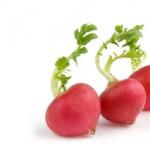It is distinguished by moderation and democracy, which is why such products are successfully used in residential and administrative interiors. Currently, artificial stone is actively used for finishing kitchen surfaces, making high-quality sinks, consoles in bathrooms, office furniture, tables and bar counters in a cafe.
Due to various types artificial stone, having general physico-chemical and performance characteristics, it is possible to implement any stylistic solutions.
Akrilika. Akripka (Acrylic) is recognized as one of the most common and popular composite materials used for the production of countertops. Such sheets have a standardized thickness of 12.7 mm. Aluminum trihydrate is used as one of the basic components for the manufacture of this artificial stone, the leading global supplier of which is the famous concern BASF. Akripka stone products are formed by gluing individual sheets together. Finished countertops are exceptionally resistant to deformation, rough mechanical, chemical and high-temperature influences, demonstrate impeccable hygiene and biological resistance to fungal infections. Due to these properties, Akripka stone structures are often used for the manufacture of laboratory furniture.
Corian. The patented invention of the DuPont company - the universal composite Corian (Corian) - is successfully used for the production of furniture to equip residential and administrative facilities, as well as medical institutions. This artificial stone is characterized by a wide range of textures and colors, as a result of which it allows you to very reliably imitate natural materials and create futuristic surfaces. Sheets of this composite have standardized thicknesses of 3, 6, 9 and 12.7 mm. Products made from Corian stone are exceptionally hygienic due to the fact that it is a low-porous material and eliminates the risk of internal cracks.
Hi-Macs. Currently, the market offers a wide range of composite materials under the Korean brand Hi-Macs, manufactured according to innovative technologies by LG Chem. Difference of this material is a high content of natural components. Hi-Macs stone is distinguished by high consumer characteristics: it demonstrates extreme wear resistance and durability, and has an attractive silky surface.
Staron. The composite material Staron (Staron), developed by Samsung Cheil Industries, is characterized by high density, making it completely non-porous and very reminiscent of natural stone. Staron composite demonstrates exceptional moisture resistance and resistance to prolonged high temperature exposure.
A universal option for furnishing kitchens and bathrooms is countertops made of artificial stone. They are durable, practical, look great, and can be integrated with the sink. The similarity between artificial stone and natural stone is striking, and the difference in price is significant, so organize a stylish and functional interior It's getting cheaper. How to choose a countertop made of artificial stone so that it meets all expectations and becomes a practical and durable decoration for your apartment? Let's understand the main ones existing technologies production and secrets of a successful purchase.
No. 1. Advantages of countertops made of artificial stone
The secret to the popularity of countertops made of artificial stone lies in their numerous advantages:

Disadvantages There are few countertops of this type, and each artificial stone production technology has its own. Acrylic stone, for example, does not react very well to contact with hot objects, and quartz agglomerate cannot boast of good repairability. These disadvantages seem completely insignificant compared to the opportunity to create exquisite interior, fully meeting the requirements for premises with increased level humidity and temperature changes. An artificial stone countertop is easy to care for, which is especially important for the kitchen: drops of grease, dirt, water and food debris will not eat into or leave marks, and the surface can be washed with almost any detergent, excluding abrasive ones.
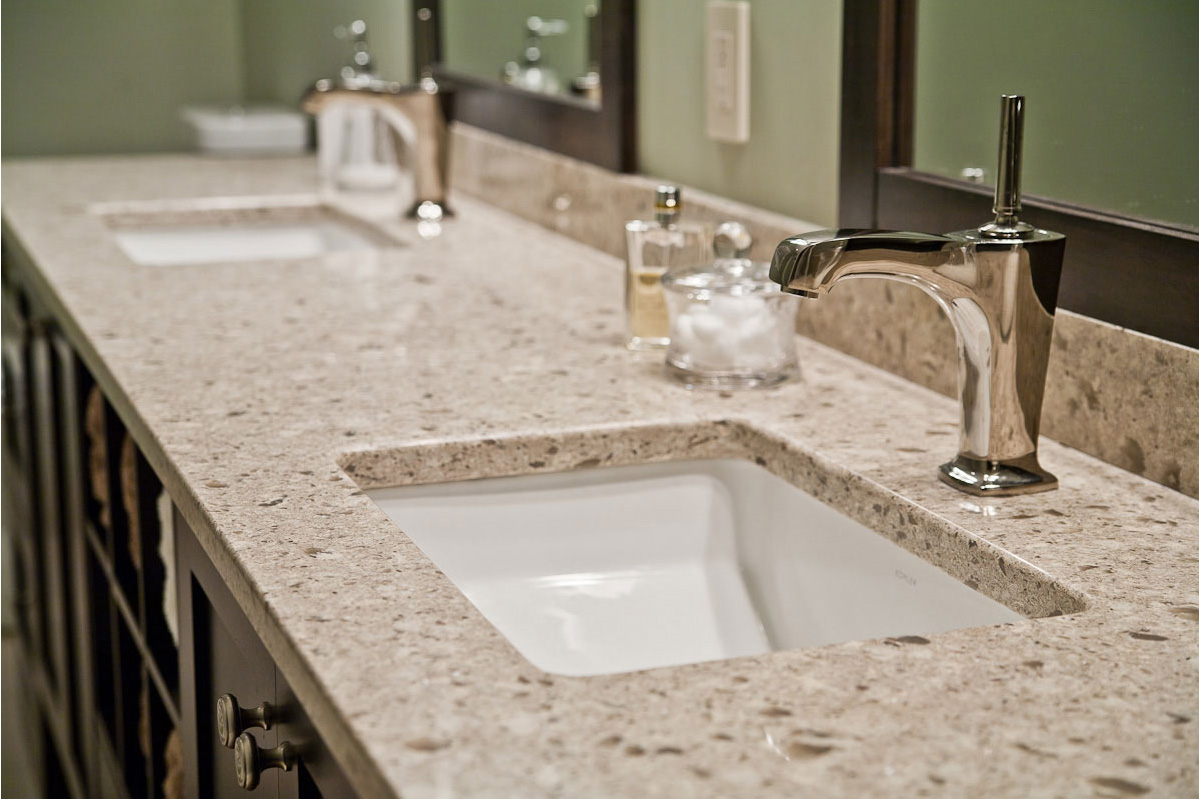
No. 2. Types of artificial stone for countertops
Artificial stone is produced from mineral filler, polymer binder, dyes and modifying additives. Different technologies provide different ratios of these components, the use different types filler and binder, hence the differences in the types of artificial stone from which countertops are made today. The main ones:
- quartz agglomerate;
The first two types of artificial stone are most widespread today: most of the countertops that are presented on modern market, made of acrylic stone or agglomerate.
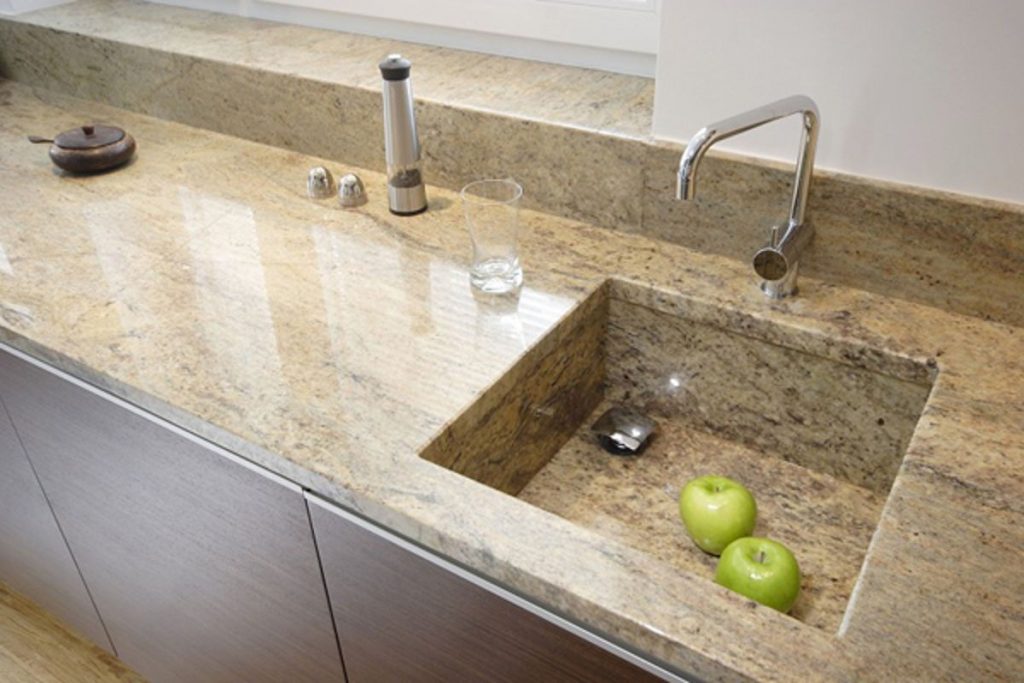
No. 3. Acrylic stone countertops
The technology for manufacturing acrylic stone appeared first among all today known methods production of artificial stone. The composite material is made based on acrylic resins, mineral filler(stone chips, its share 60-70% ), dye and aluminum hydroxide. All components are thoroughly mixed until a homogeneous viscous mixture is obtained, which is poured into a mold where the material cools and forms. The technology allows you to create tabletops virtually all shapes and sizes, but the benefits of acrylic stone do not end there. The advantages also include:

There are countertops made of acrylic stone and some disadvantages:
- fear of very high temperatures. If you place a hot frying pan or pan on the countertop that has just been removed from the heat, a mark will remain on the surface - to ensure that the original appearance of the countertop is preserved, it is better to use special hot mats;
- washing with abrasive agents and moving dishes can cause scratches. However, it is easy to get rid of them by sanding.
The technology for the production of acrylic stone was patented by the company in 1968 DuPont, which produced the product under the Corian brand. For a long time only she could produce acrylic stone, but after the patent expired, other companies also gained access to the technology, so the production of acrylic stone is now established in many countries. In Moscow, artificial stone products are offered by the company “Enot`s Stone”, which has own production and uses raw materials from large, trusted suppliers, which allows it to provide customers with the best possible prices and a 5-year guarantee, as well as offer exclusive countertops made according to individual order.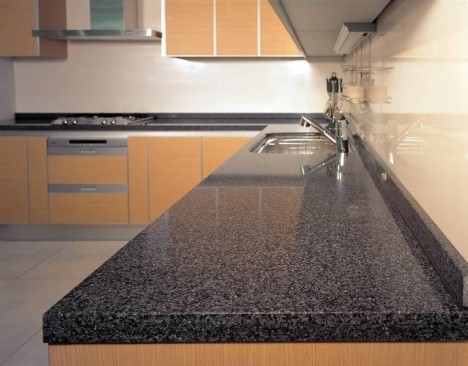
No. 4. Countertops made of quartz agglomerate
Quartz agglomerate is even more reminiscent of natural stone, but at the same time significantly surpasses it in basic physical properties(see table). They produce material based on mineral filler, which is often used as crumbs and even pieces of natural quartz, less often marble or granite. Mass fraction of mineral filler in total mixture is 91-93%, which explains the unique properties of the material. Used as a binder polyester resins, coloring pigments are also added to the mixture.

Comparison of quartz agglomerate with natural stones
Advantages of countertops made of quartz agglomerate:

Minuses:

No. 5. Countertops made of polyester stone and cast marble
Polyester stone and cast marble are much less commonly used in the production of countertops, but since the range of some manufacturers still includes similar offers, we will focus on the main properties of these materials.
Polyester stone They are produced using a technology similar to acrylic stone, only polyester resins are used instead of acrylic resins. They are cheaper, which allows you to get much more more affordable countertops. In terms of strength, durability and moisture resistance, it is impossible to find fault with them, but there are some nuances that explain the reduced demand for the material. Firstly, it emits a specific smell, although it fades over time. Secondly, the production features do not allow the creation of bent shapes, so the countertops are produced only in traditional, strictly sealed shapes.
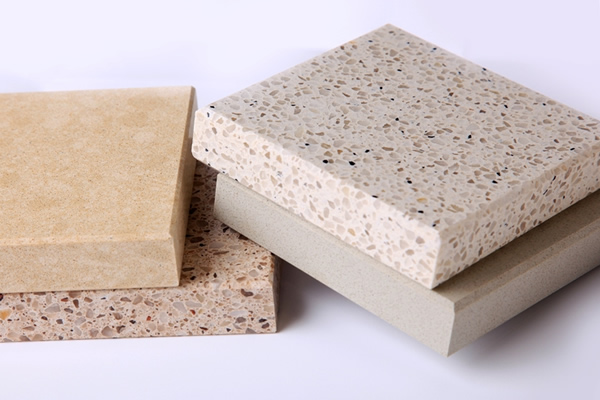
Cast marble produced on the basis of marble chips (about 80% of the total mass), polyester resins and pigments. The material is significantly superior in strength and moisture resistance to natural marble, looks great, and can be used in bathrooms as countertops.

No. 6. Parameters of artificial stone countertops
The first thing you should pay attention to when choosing is table top thickness. Acrylic stone is usually glued to a frame, for which plywood is used ( best option), or chipboard. It is important that the frame is strong and strong, and the quality of the gluing is reliable. The thickness of the stone itself may vary from 3 to 12 mm and more, but this does not affect the performance of the countertop. Thickness affects how many times you can sand its surface, which means it is directly related to durability. If you are not a fan of global changes of environment, then it is better to choose a thicker tabletop.
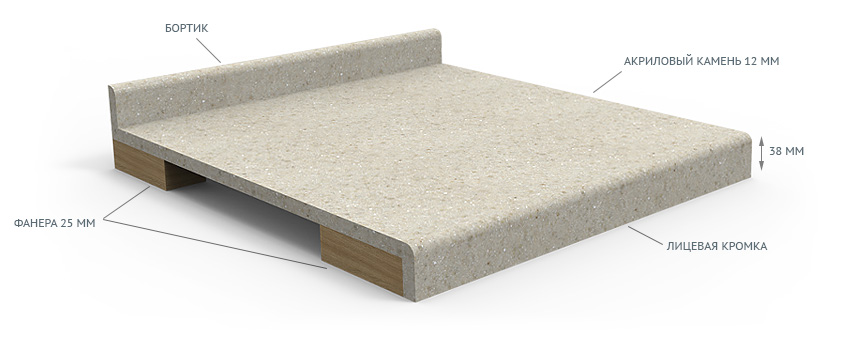
Quartz agglomerate usually does not have a substrate, which has a positive effect on its operation, because for rooms such as the kitchen and bathroom, the absence of a moisture-resistant substrate means less problems. If the agglomerate countertop is without a backing, then it will weigh more, and the greater the weight, the more difficult it is to transport and the greater the load on the supporting elements. By the way, some manufacturers suggest gluing a thicker edge to a table top 1-1.5 cm thick (the most common option), but this is purely for visual effect.
It is worth remembering that installing a countertop made of quartz agglomerate, which involves gluing several parts and processing the seams, will cost more than installing a similar countertop made of acrylic stone. On the other side, the cost of a countertop made of acrylic stone is higher, and color palette they are wider. It is possible to create countertops of more complex shapes from acrylic stone.

Width The countertop corresponds to the depth of the cabinet on which it will be installed. For kitchens, the standard is 60 cm; in bathrooms, this parameter can differ significantly. Sometimes the width of the tabletop can exceed the depth of the cabinet, but this is in cases where it is necessary for it to protrude a little.
No. 7. What else to consider when choosing?
Acrylic stone countertops can cause scratches and are best seen on dark colored surfaces. If you don’t want to do frequent repairs, give preference light shades and non-glossy surfaces, and it is desirable that the material has small inclusions, since on a plain surface all scratches and dirt are visible much better. Besides, light tabletop suitable for decoration. There are countertops with big amount inclusions: damage is least noticeable on them, so this perfect option for furnishing a kitchen where a lot of cooking is done.
Artificial stone color can be almost anything, except for classic light and dark shades, you can also find bright countertops that will become an integral part. When choosing the color of the tabletop, you should be guided not only by the size of the room, but also by the color of other pieces of furniture, incl. kitchen set or cabinets under, if we're talking about about the bathroom. If the furniture facade white, then the tabletop can be black, light and even bright - there is the greatest scope for imagination. For beige furniture facades countertops in warm, rich colors are perfect; for black and wood-look facades, you can choose white and light countertops.
Finally, we note that if the design idea involves the use of large tabletops of curved shapes, then it is better to give preference to acrylic stone, which will allow installation without seams. An artificial stone countertop is a durable product that, with minimal care, will serve faithfully for many years.
How to choose a countertop for the kitchen?
Which countertop to choose for the kitchen is not an easy task. Of course, because now is enough big choice countertops for the kitchen, and with this question a number of others immediately arise: choosing a sink, faucet, apron, etc. In this article we will not describe all the options, but the most popular ones, which are most often asked by our clients and clients of kitchen salons. We tried to approach the question objectively, described the pros and cons of different countertops, answering your question: “How to choose a countertop for the kitchen”
Countertops that are chosen for the kitchen:
Kitchen countertops made of chipboard.
How to choose a kitchen countertop to save money!? Tabletops made of chipboard or MDF laminated with plastic are the most affordable tabletops. Most often they choose a kitchen countertop with a thickness of 38 mm, less often 60 mm. Chipboard countertops are resistant to mechanical stress, heat-resistant, and do not fade. If the countertop is not planned for a long period of time, then of course there is no point in buying a countertop made of artificial stone, it is better to take Chipboard table top laminated with plastic. The disadvantages of such a tabletop are the joints - seams, and aluminum profile violates between them common plane countertops, for example, if it is corner. This may cause inconvenience for the hostess. Dirt usually collects at the joints, which is difficult to remove with a rag. The baseboard, in our opinion, is also not as convenient and compact as that of an artificial stone countertop. Which does not significantly reduce work surface. It is not very convenient to wash such a plinth; the silicone base, which is glued to the tabletop and to the wall, has an uneven profile shape, which complicates care work area, dirt and grease accumulate on the profile, which is difficult to remove with a rag. If the base of the tabletop is Moisture-resistant chipboard- this is of course a plus, but with prolonged exposure to water, the chipboard will swell and the plastic will swell, this happens at joints, chips or near the cutout for the sink, if the cutout was not well covered with silicone. Also, the edges of the tabletop can chip over time, since the plastic, although durable, is thin and therefore fragile. A kitchen countertop made of chipboard is limited by the choice of profiles - the shape of the edges. Of course, it’s up to you to decide which countertop to choose for your kitchen, but if the countertop is planned with radii or a large number of corners, that is, the countertop will not go along flat wall, then we recommend ordering a countertop made of artificial stone. Only by choosing a kitchen countertop made of artificial stone can you further enjoy the absence of seams and not worry about water that ends up on the countertop. Artificial stone is absolutely not afraid of water.
Kitchen countertops made of artificial stone.
The question is not even how to choose a countertop for the kitchen, but what countertop to choose for the kitchen!? Artificial stone, or rather countertops made of artificial stone, is gaining immense popularity these days. Until recently, a countertop made of artificial stone was a luxury item, however, now it is not a luxury, but a means of making life easier for the “owner” of the kitchen. Artificial stone is composite material, consisting of acrylic resin and “white clay” - a natural filler. Countertops made of artificial stone are environmentally friendly, are not at all afraid of water, and do not leave stains from spilled wine, blueberry jam or coffee. The countertops are chemically resistant, for example, to acetone, which is often contained in nail polish remover. Mold cannot form on the countertop, since artificial stone has no pores. The acrylic material itself is non-flammable, which is good for fire safety. Both when choosing a countertop for a kitchen made of artificial stone, and when choosing a countertop for a bathroom with a similar material, you can experiment and bring different fantasies to life.
Any countertop shape, any thickness, a wide range of colors, the ability to integrate the sink into the color of the countertop, the apron can also be the color of the countertop, smoothly flowing onto the wall. Such solidity, a feeling of a single whole can be achieved only by using artificial acrylic stone; its connections seem seamless.
Kitchen countertops made of artificial stone are durable, they can be repaired at the address if there was a chip or a strong impact that could form a crack. It is possible to add a bar counter to the tabletop in the future, for example.
The easiest way to care for them is to use a rag with soapy water or another dishwashing liquid, the main thing is that it is not abrasive.
Illumination can add beauty and mystery to the kitchen interior, since artificial stone samples contain translucent stones with modern bright colors. This means that your tabletop can be completely illuminated from the inside. Kitchen countertops made of artificial stone have the greatest possibilities - there is no limit to imagination. Of course, such a countertop will be 2 times more expensive than a kitchen countertop made of chipboard, but it’s worth it.
Countertops are an element of the kitchen space that bears a very significant load, both functional and design. A well-chosen countertop supports and continues the overall style of the interior.
The main criteria when choosing a countertop are the material from which it is made and the design. How to choose a countertop for the kitchen so that it is practical, beautiful and fits into the overall design?
Table top:
What material to choose for making countertops?
Now there is a whole list of materials that go into making countertops. Each of them has its supporters and opponents, its own advantages and disadvantages. Let's look at the good and bad of countertop materials:
Laminate. Affordable and relatively practical material, especially if it has a deeply colored laminate coating. On this coating, scratches are almost invisible, due to the fact that all layers of the material are painted the same. The disadvantages of countertops made of laminated plastic include low resistance to mechanical damage and high temperatures.
Chipboard. Quite thick sheets, usually from 35 mm, which are impregnated special compounds to increase their resistance to moisture and steam. The slab is then coated with acrylic resins. In this case, postforming technology is used, when chipboard sheets are literally wrapped in layers of coating. It is this that gives high resistance to abrasion, mechanical stress, impact resistance and heat resistance. The technology of protective coatings allows them to be made in different designs: the patterns and colors of such countertops can be the most bizarre. As a rule, chipboard countertops are sold with raw edges. Worth it when purchasing Special attention pay attention to carefully gluing melamine edge strips and ensure high-quality installation of the tabletop, because most problems with them arise precisely because of poor installation. Another disadvantage is that they are not environmentally friendly due to their high content of formaldehyde resins.
A natural stone .As a rule, basalt and granite are most often used, less often- marble. Due to its looser structure, it is more fragile and absorbs moisture. Such elements kitchen design difficult to damage at home. Reliable, durable, and an environmentally friendly product. The beauty of natural stone surpasses ingenious design delights.
The disadvantages are the large weight of the slab, high cost, and complexity of installation. Natural stone is not very convenient because it is susceptible to chemical reactions, and this is its significant disadvantage. Under the influence of substances familiar to any kitchen (lemon, soda, coffee, fruit juices, etc.), it may lose its original shine, and stains and stains will appear on its surface. To avoid this, it is necessary to properly care for stone products - clean and protect them with special compounds.
Another disadvantage is that granite has an increased background radiation.
Original materials for countertops:
Metal. Typically, stainless steel is used to make countertops. This material is durable, resistant to moisture, steam, household chemicals, relatively resistant to mechanical stress. Polished stainless steel is practically irreparable, so it is better to choose a corrugated or ribbed surface for a metal countertop. The disadvantage of metal countertops is that they do not change rectangular shape, which provides virtually no opportunity for design creativity. With active use, stains and scratches remain on it, which is why over time it loses its flawless, smooth appearance.
Glass. Glass worktops have recently begun to conquer the kitchen space. However, their strength, resistance to many types of impact, application of patterns, inclusions and colors attracted the hearts of designers and consumers to them. Glass tabletops look original; they are made of specially tempered glass.
Solid wood. Of course it's beauty natural wood not comparable to artificial materials. Wooden countertops are made from stacked panels and coated with special compounds. The tabletops are beech, oak, alder, and larch. Unfortunately, in addition to beauty and environmental friendliness, these countertops cannot boast of resistance to high temperatures, mechanical stress, or chemicals. detergents. That's why wooden table tops are used less and less.
Fake diamond.
Man-made acrylic sheet stone is a good transitional option: while having the strength and wear resistance of a man-made composite material, it contains natural particles, giving it a more natural look. An undoubted advantage is their plasticity.
The mass, heated to a certain temperature, from which the tabletop is formed, can be poured into absolutely any shape. This provides endless possibilities for design solutions.
In addition, products made from artificial stone have virtually no restrictions on length and width. Even if you have to assemble a tabletop from several pieces, the joints are rubbed down so well that the joints are completely invisible.
Unlike many natural stones, their structure is not porous. Does not allow dirt, dust and moisture to pass through or accumulate (sinks are even cast from these materials). During operation, products made from acrylic stone are self-polished, which is why they always have a beautiful appearance. If not much appears on the surface deep scratch, over time it evens out and is not noticeable. If the damage is more serious, the product can be easily restored - after professional grouting and polishing, there is no trace left on the countertop even from a chip
Acrylic countertops are a mixture of fine stone chips and synthetic resins holding them together. The variety of shapes and colors of such countertops provide great scope for their use in design. kitchen furniture. Resistance to almost any type of damage is complemented by relative ease of recovery. It should be noted that such countertops do not even react to chemical influences, which is in no way typical of the materials described above. The most significant disadvantages are the high cost.
How to choose the color of the countertop?
Selection color range and the design of the countertop - this is one of the key issues in the design of kitchen furniture. The design of this interior element also depends on what material was chosen for manufacturing.
Bright colors - yellow, orange - will be appropriate if the overall design of the kitchen is made in fairly bright colors. In addition, a monochrome bright tabletop will help create a color accent, for example, in a black and white or interior.
Light-colored countertops are appropriate in a small kitchen, or to create a single space without clearly defined boundaries.
Warm shades of countertops, such as peach or pink, look great on cold kitchen or an overly dark kitchen.
The color of the countertop should be in harmony not only with the wall covering and furniture, but also with kitchen apron. It is better if they are consistent in the same color scheme, or harmonize in color. The sharp contrast between these elements will make this area of space visually smaller.
A classic interior can be complemented with a white element, and a high-tech space can be complemented with a tabletop made of of stainless steel or gray with a glossy finish.
A well-chosen countertop can diversify the interior and give it a fresh accent. For new furniture, the surface becomes the touch that completes the whole picture, so take your choice seriously. Let the countertop in your kitchen be functional, comfortable, reflect your personality and highlight the unified style of the space.
If you are planning to install a stone countertop in your kitchen, then you need to clarify what kind of stone you are going to use.
Today there are three types of this material:
1. Artificial stone or, as it is often called, acrylic stone consists of a mineral filler (60-70%) and acrylic resin.
2. Agglomerate is also an artificial stone, but consisting of stone chips (95-97%) and polyester resin.
3. Natural stone (marble, quartz, granite).
Let us briefly examine the advantages and disadvantages of each type.
Acrylic stone
Of course, this composite can hardly be called a stone, but by and large- This is a very durable plastic. But thanks to its appearance, the name artificial stone was assigned to it. Its advantages are clearly visible in the production of countertops. Only with it is seamless technology possible. Its properties make it possible to produce products of the most bizarre shapes that a designer can decide on.
The advantages of this composite: high strength, impact resistance, absence of micropores. It does not absorb moisture and food coloring, and is easy to clean and restore.
But during operation, you should not place hot pots and pans on the acrylic surface. No need to cut bread and other foods on it, no need to scratch trying to remove a dirty stain.
Agglomerate
When producing agglomerate for countertops, quartz, one of the most beautiful and hard minerals, is most often used as stone chips. Considering its significant amount in the composition of the material, quartz agglomerate can safely be called a close relative of stone.
All its advantages are visible. He is not afraid of hot objects and over-washing the surface. Does not allow moisture to pass through and may even have antibacterial properties.
But when installing a tabletop more than three meters long, it will not be possible to avoid seams.
A natural stone
Marble and granite. Strength, reliability, durability. They are not afraid of moisture, high temperature, or direct rays of the sun. Combines perfectly with other materials - wood, glass, metal and plastic.
But, unlike its artificial counterparts, it is quite fragile. Therefore, installing a countertop made of natural stone requires high professionalism. The same precautions will not hurt when transporting it.
Kitchen countertops made of quartz agglomerate.
We can say that quartz agglomerate is a hybrid of natural and artificial acrylic stone. Choosing a kitchen countertop made of quartz agglomerate will be more expensive than a kitchen countertop made of artificial acrylic stone by about 20% -30% depending on the stone. Of course, any material has its pros and cons. Quartz agglomerate is a composite material consisting of 93% quartz and acrylic resin. Countertops made of quartz agglomerate are already a luxury. The advantages of such a kitchen countertop are that it is extremely durable; you can cut meat or fish on it with a knife and there will be no marks left. You can put hot food on a quartz countertop, but it is not recommended to put hot food on a countertop made of artificial acrylic stone, since the area of the countertop in this place may turn white. By weight the tabletop is made of quartz stone approximately 2 times heavier than acrylic. The weight is close to a natural stone countertop. There will also be no traces of coffee, wine or other coloring substances left on the countertop made of quartz agglomerate. Such a choice of countertop for the kitchen will be devoid of solidity if there is a desire to combine the countertop with an integrated sink and smoothly flowing onto the wall wall panel- apron for the kitchen. Unfortunately, there are restrictions on the shape and the choice of colors is smaller. It is impossible to make smooth transitions from quartz agglomerate and sinks made from the same material can only be square and their cost is quite high, about 50 thousand rubles. There are also restrictions on radius elements, since the material is not currently bent, unlike artificial stone. You can make simple radii where the material does not need thermoforming.
Kitchen countertops made of natural stone.
Natural stone has a unique pattern. The price is in the range between artificial acrylic material and quartz agglomerate. An undoubted plus is its natural beauty. But in terms of practicality, in our opinion, it is inferior to both quartz agglomerate and artificial acrylic stone. Its disadvantages: fragile; Can not be repaired; its weight is close to quartz, that is, it is also heavy; has pores. And if you take marble, it is also very soft. Porosity on granite can play a significant role, for example, if vegetable oil, then the stain will not go anywhere. There will be no way to get him out. In addition, when choosing a granite countertop for a kitchen, it will always have an increased background radiation. In St. Petersburg, the highest radiation background was observed on the Field of Mars, at the monument to Peter the Great and on the Neva embankment. Granite is used everywhere there. Natural stone kitchen countertops require serious care. And some types of marble may not significantly rust over time. By the way, natural stone is practically cold to the touch, just like quartz, and artificial acrylic stone is warm.
The main news of our company:
At the end of this year, together with our partners, we will master the production of countertops made of quartz agglomerate and natural granite.
The natural stone used is granite, obtained from quarries all over the world.
The thickness of the granite sheet is 20 or 30 mm. (2-3 cm) and contains about 70% natural quartz.
We use artificial stone as quartz stone, which consists of 95% natural quartz. For example " SAMSUNG RADIANZ ».
The thickness of the quartz sheet is 12mm, 20, and 30mm.
All detailed information You can get information about stone products by calling 8-920-032-81-85 Alexander.
Acrylic stone.
The main activity of our company will continue to be the production and sale of countertops and other products made of acrylic sheet stone of any brand.
As an acrylic stone, we use an artificial stone - a composite material consisting of a mineral filler (aluminum trihydrate, which natural white clay is made of) and acrylic resin (a high-tech and environmentally friendly binding element).
This stone was invented by man in 1966. in order to eliminate the disadvantages of natural stone, thanks to the very dense structure of acrylic resin.
We have extensive experience in processing this material, which allows us to save high quality manufactured products, and their relatively low cost.
The production time for these products is the shortest in Nizhny Novgorod.
Artificial stone (acrylic stone) is the original finishing material, imitating natural stone, also has the name “AcrylicSolidSurface” (“Acrylic solid surfaces”).
In our time of rapid development of technology and production, the issues of preservation are very acute. environment and use environmentally pure materials in interiors. One of the undoubted advantages is its environmental friendliness. The company maintains high environmental standards, starting from the raw materials used, the production process and ending with waste processing.
The material contains: aluminum tri-hydrate - white powder, on the basis of which toothpaste is made; acrylic resin, which is actively used in dental practice when installing fillings, as well as food pigments, which are absolutely harmless to humans. The stone surface does not emit any odors, not to mention background radiation.
The stone is a composite material based on natural minerals and acrylic resin. These components make the material, on the one hand, solid, and on the other, non-porous, continuous in structure. The surfaces are not afraid of spilled liquids and stains. Seamless connection eliminates seams and joints - traditional places where dirt accumulates. Due to its nature, the stone is easy to clean and caring for it is not difficult. But, like all decorative materials, the best way will retain its qualities if handled with care.
The stone is hard, impact-resistant, resistant to mechanical stress and most aggressive environments. In conditions high humidity Mold and mildew do not appear. For the manufacture of products from this material, a seamless gluing technology was specially developed, so there are practically no joints or seams.
Consumer properties of artificial stone, such as strength and durability, are as close as possible to the characteristics natural stone, but at the same time, artificial stone has a number of advantages over it.
Thus, we have very briefly become acquainted with the variety of stones used in the manufacture of kitchen countertops. Knowing their composition, you can guess which material is the heaviest and most expensive.
When it comes to installing stone countertops, we recommend that you contact only professionals. Amateur performance will not work here.
Currently, new technologies are constantly being developed in different areas human activity, especially in the field of design. New materials are constantly being developed to create unique items that become real works of art.
Artificial stone is becoming increasingly popular among materials. This is not surprising, since this material is environmentally friendly, modern, has long term operation. There are a huge number of types of artificial stone, but each of them contains approximately the same substances.
What does this material consist of? The basis for creating artificial stone are polymer resins and granules. The quality, cost and grade of the product depend on which resins are used to create the stone. Aluminum trihydrate is the main component in most cases. This substance has qualities such as water resistance, impact resistance, it is impervious to stains and other chemicals. Other materials are fillers. Thanks to them, the products are durable and become possible creation various effects.
A very important role in the composition of artificial stone is played by pigments, which give the stone specific color, and also improve Chemical properties. These pigments affect the service life even during transportation. The unique composition allows artificial stone to be used in a wide variety of areas: from kitchens and bathrooms to commercial premises such as airports, hospitals, schools and banks.
Advantages of countertops made of artificial stone.
There are many advantages of countertops made from artificial stone over ordinary laminated ones. The most important positive quality artificial stone is the ability to give it absolutely any shape, round and oval, it can be beautifully decorated custom kitchens and bay windows. This allows designers to realize even the most daring ideas and solutions. Such countertops are harmoniously combined with other interior elements. Their configuration can be of absolutely any complexity, thanks to which the tabletop is connected to the other parts without joints or seams. Now, thanks to the gluing method, any rotations and angles of the tabletop are possible. In addition, seamless connection of elements has become possible different color, which makes artificial stone an even more unique find for any designer.
If it’s difficult for you to decide on a specific color, the designer can offer a whole range of different color combinations and solutions. The surface does not absorb moisture at all, which means that it will never be stained by products such as coffee or oil. Countertops made of artificial stone are the safest and most hygienic, preventing the occurrence of contamination and various bacteria. This modern material has an important distinctive feature: its surface has no pores and, as a result, there are no cracks.
Another obvious advantage of countertops made of artificial stone over others is the amazing strength of the new material. Even the most unforeseen situations will not be able to change the service life, since such surfaces can easily be repaired. Such countertops are easy to clean: ordinary cleaning products are used to clean the surface, even those containing aggressive preparations. If small or medium scratches appear, they can be easily removed using fine sandpaper, this is completely harmless, since the stone has a uniform structure and is easily restored. The countertop made of artificial stone is easy to carry high temperature, you can even place hot dishes on it that have just been taken out of the oven. The aesthetic appearance of the surface will not be affected at all.
Manufacturers of artificial stones.
Before making a purchase, people think about which manufacturer to choose. In order to decide, you need to know the advantages and disadvantages of each of them. So, many people prefer products made from artificial stone “Corian” or “tristone”. since he has almost everything positive properties and qualities. It goes well with any material: plastic, glass, wood. Thanks to a special super-strong glue, it seems as if even a large object was created from one solid piece. The material is incredibly plastic and can take on a wide variety of shapes when processed. The brightest advantage of artificial Corian stone is its wide range of colors, which can satisfy even the most demanding customers. In addition to all of the above, Corian is incredibly durable material. Appearance interior items remain in their original form for a long time, and even your grandchildren and great-grandchildren can confirm this! The only drawback some may note is the expensive cost of this material. However, we all know the saying “the miser pays twice,” so you need to draw your own conclusions.
Domestic manufacturers offer to purchase artificial stone at more low prices. It has been used in our country for about ten years, and during this time it has turned from an imported elite material into an affordable one. The material currently occupies an extensive position in the construction market decorative materials. The demand for it is constantly increasing, since it is environmentally friendly, moisture-resistant and its cost is relatively low. In terms of quality, it is practically not inferior to a foreign manufacturer, and is also adapted to the climatic conditions of our country.
When choosing a material, you should be careful, since not all manufacturers supply products that fully comply with all requirements and standards. Sometimes the material is porous, short-lived or has a negative effect on the human body. In order to protect yourself from such low-quality goods, you should pay attention to the guarantee offered by the seller. If the material is chosen wisely and the color scheme is thought out in advance, then countertops made of artificial stone will serve you for a very long time and remain in perfect condition.




